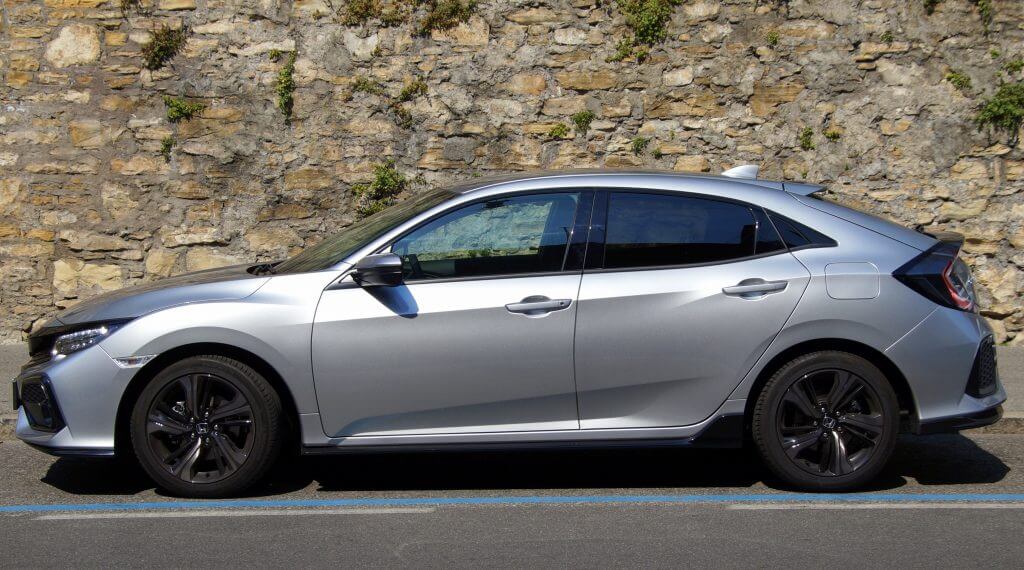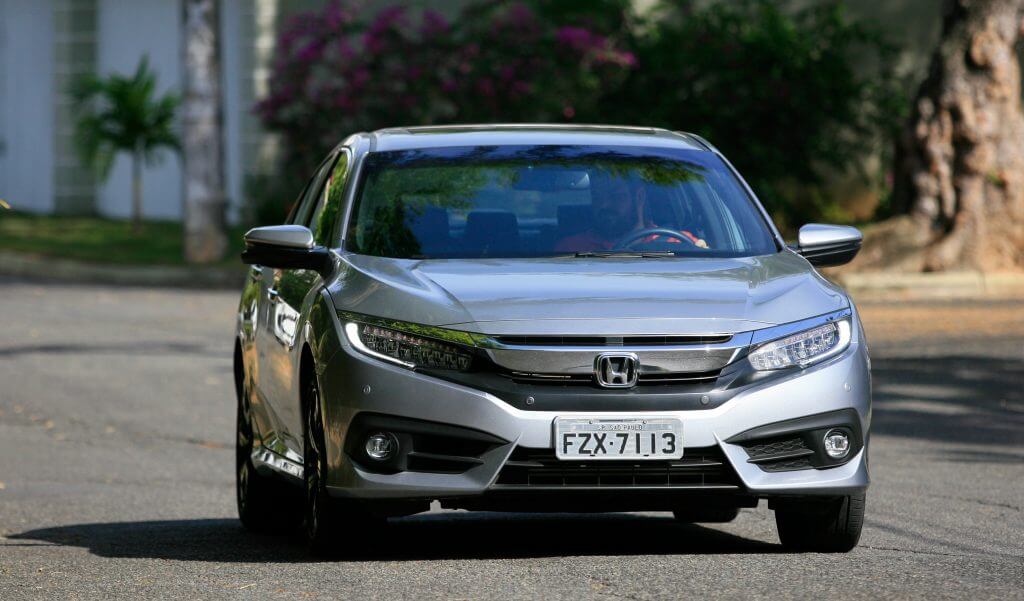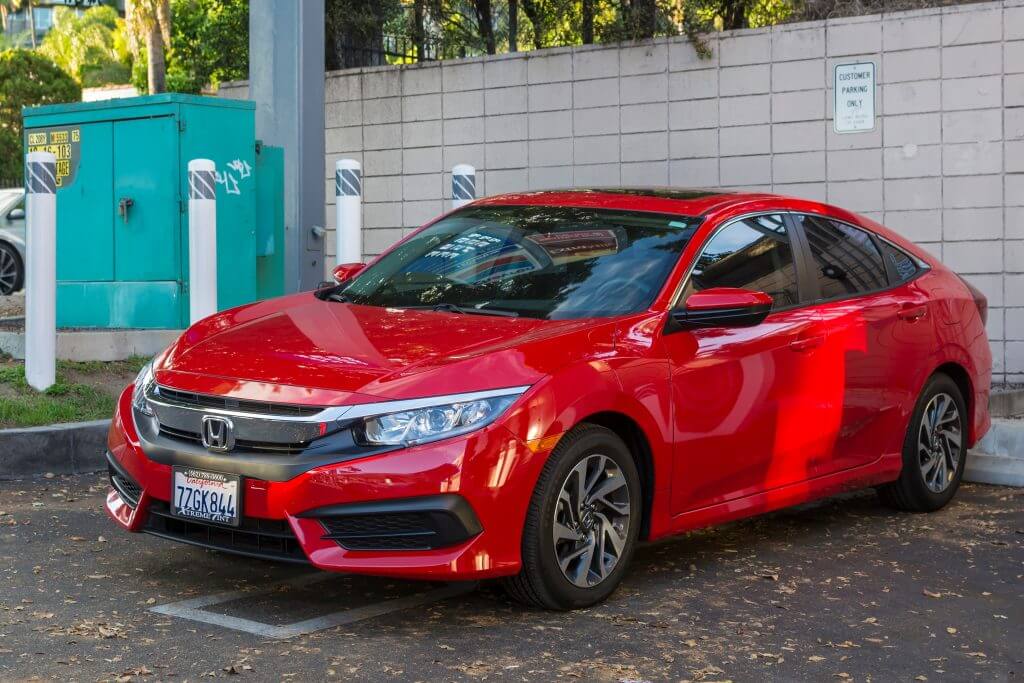Honda introduced an all-new Civic sedan and hatchback for the 2016 model year, featuring sleek styling and a re-engineered suspension. Even in an SUV-heavy market, U.S. consumers purchased more than 360,000 tenth-generation Civics in the first year alone.
But some owners, including those with certain Civics (from the 2016 to 2021 model years), encountered troubles with malfunctioning air conditioning, leading to demands for a recall and legal action.
It’s not unusual for an all-new vehicle to undergo “teething problems” during its first few years. But these troubles are typically associated with complex components like the engine, transmission, or electrical system, not something as ordinary as air conditioning.
However, this version of the Civic is the first to use R-1234yf refrigerant, which some owners allege leads to an over-pressurized air conditioning system and leaks. This has the potential to be a major headache for more than one-and-a-half million Civic owners in the U.S. alone, especially as Honda has yet to issue a recall for the problem. Instead, the company has offered a warranty extension with particular conditions.
Let’s review what’s involved with the Honda Civic air conditioner situation and the company’s response. There are also details to understand about the Honda warranty extension; vital information if you own a 2016-2021 Honda Civic or are considering buying one. We’ll also cover how to get related repairs done on Honda’s dime.
Overview: Honda Civic Air Conditioner Problems

There are two sides to every story, which is undoubtedly the case with the troublesome tale of malfunctioning air conditioning in some Honda Civic models. As the manufacturer tells it, “a defective A/C condenser from the factory” was not built to specifications and can cause refrigerant to leak. Specifically, small holes may appear on the condenser tube walls, according to an August 2019 service advisory issued by Honda.
But plaintiffs in a class action suit (Amado Munoz et al v. American Honda Motor Co., Inc. et al) believe there’s more to what Honda is reporting. This group of Civic owners thinks the problem stems from something more fundamental, the use of R-1234yf. This environmentally friendly refrigerant was first used in the auto industry in 2015. The suit alleges that tenth-generation Civics can’t handle the extra pressure generated by R-1234yf with the condenser, compressor, evaporator, and refrigerant lines prone to failure.
An earlier suit was dismissed, with the more recent action reported as being administratively closed, the legal equivalent of being placed on hold until either party (the plaintiffs or American Honda Motor Company) seeks a specific course.
Honda’s Response to Civics with Air Conditioner Issues

A recall is the last resort for an automaker; they’re expensive and complex to administer and must involve the National Highway Traffic Safety Administration (NHTSA). For instance, recalling almost every 2016-2021 Honda Civic for a bad air conditioning condenser could easily involve hundreds of millions of dollars, if not more.
One way a manufacturer will seek to head off a recall is by issuing a warranty extension for the specific component or system in question. Curiously, Honda announced the warranty extension for the Civic’s air conditioning condenser three months after the Munoz et al case was filed in a California court. There’s no word from Honda if the warranty offering stemmed from the suit, but it’s a safe bet the two actions are related.
Honda Civic Air Conditioner Warranty Extension
Honda first announced the Civic condenser warranty extension in a technical service bulletin (TSB) sent to dealers on August 9, 2019. A TSB (Honda calls them Service Bulletins) is sometimes known as a secret or hidden recall. These advisories instruct dealers on how to correct specific problems without the legal ramifications of an official recall. Often, owners are unaware of the applicable TSBs for their vehicles.
The August 9 TSB mentions that “American Honda is extending the warranty on the A/C condenser to 10 years from the original date of purchase with unlimited miles” and initially covered all Honda Civics from the 2016-2018 model years. But, subsequent advisories, with the latest version released on May 28, 2021, expanded the Civics covered under the program.
Here are the affected Civic models.
| Model Years | Version/Body Style | Service Bulletin # |
|---|---|---|
| 2016-2020 | Civic 2- and 4-Door | 19-091 |
| 2017-2021 | Civic 5-Door | 19-091 |
| 2017-2021 | Civic Type R | 21-014 |
It’s essential to know that Honda has included precise language about what Honda Civics qualify for the extended condenser warranty. Coverage “does not apply to any vehicle that has a leaking condenser due to foreign object damage,” which can be a problem for an unsuspecting owner.
A Honda dealer can inspect a Civic with a bad condenser and claim the malfunction is due to damage caused by flying road debris. The plaintiffs in the now on-hold class-action suit alleged this was a frequent practice by dealers seeking to deny warranty claims.
Warranty Extension or Extended Warranty: What’s the Difference?
While the terms sound similar, there’s a notable difference between a warranty extension and an extended warranty. As mentioned with the Honda Civic air conditioning condenser, a warranty extension is extra coverage provided by an automaker for a specific problem or component.
Alternatively, an extended warranty is supplemental protection for use after the expiration of the new car warranty. An extended warranty (also referred to as a vehicle service contract, extended service plan, or vehicle protection plan) can come close to the coverage of the manufacturer’s original warranty or concentrate on certain systems, such as the engine and transmission. An extended warranty may come from the manufacturer, its dealers, or a third-party business. To learn more about car warranties, check out The Ultimate Guide to Car Warranties.
Getting Repairs for a Honda Civic Air Conditioner
Automaker warranty work begins at an authorized dealer. So, those with a Civic and an inoperative air conditioner will need to reach out to a Honda dealer for help. At the service department, let the advisor know you’re making a claim under the condenser extended warranty. There should be no charge for this warranty work if the problem qualifies under the coverage. However, there may be a diagnostic fee and repair charges if the problem isn’t a covered issue. Remember that newer tenth-generation Civics may still be under the original bumper-to-bumper warranty.
Those considering buying a used 2016-2021 Honda Civic should determine if the vehicle has already undergone air conditioner repairs. Contact a Honda dealer with the vehicle identification number and ask if they can look up the repair history for the car.
Frequently Asked Questions About The Honda Air Conditioner Recall

Are Honda Civics known for air conditioning troubles?
While Honda vehicles generally enjoy a good reputation for reliability, Civics from the 2016 to 2021 model years are notorious for having a troublesome air conditioning system. Honda officially recognized the problem with the August 2019 release of a technical service bulletin on the matter.
Does the Honda warranty include air conditioning?
Honda’s new car warranty provides bumper-to-bumper coverage on all systems, including the air conditioning, for three years or 36,000 miles, whichever comes first. The automaker added a ten-year warranty extension (based on the original purchase date) on the air conditioner condenser for the 2016-2021 Civic. Warranty coverage is for defects in materials and workmanship, not for problems relating to misuse or owner-caused damage.
Does the air conditioner in a 2016 Honda Civic have a recall?
At this time, there is no air conditioning-related recall of the 2016-2021 Honda Civic.
Are air conditioner problems covered by Honda?
Honda covers air conditioner problems under its new car warranty. For the 2016-2021 Civic, issues related to a defective air conditioner condenser are handled through the ten-year warranty extension. Otherwise, air conditioner repairs are the responsibility of the vehicle owner.
What is the cost of repairing a Honda Civic air conditioner?
The average air conditioner repair costs $685 to $726, but simpler jobs like recharging the system cost around $150 (or even less with a DIY approach).
Is it expensive to replace the air conditioning in a Honda Civic?
Warranty repairs for a Honda Civic air conditioner are performed without cost to the owner. However, work done outside of warranty coverage can be expensive. For example, replacing a faulty condenser (something the warranty extension covers) runs about $500-$600. Yet, more comprehensive repairs, such as a complete system replacement, can run into the thousands.
What is the lifespan of a Honda air conditioner compressor?
Ideally, the Honda air conditioner compressor lasts the life of the car; there have certainly been examples of this. But it’s not unusual for a compressor to start to show problems after eight years (or sooner if the vehicle has high mileage). Replacing an AC compressor costs about $800-$1,000, but repairs often start with recharging the refrigerant.
How can I tell if the air conditioner in my Honda Civic is defective?
The most obvious symptom of a troublesome Honda Civic air conditioner is a lack of cooling inside the cabin. There could also be unusual noises (such as a grinding or squealing sound) coming from the air conditioning system under the hood. Some problems may be discovered through diagnostic trouble codes, such as P0645, P0646, and P0647, which indicate a problem with the air conditioner clutch circuitry.
References
- Service Bulletin 19-091 (August 9, 2019), American Honda Motor Co. Retrieved December 9, 2022, from https://static.nhtsa.gov/odi/tsbs/2019/MC-10163796-0001.pdf.
- Service Bulletin 19-091 (Rev. May 28, 2021), American Honda Motor Co. Retrieved December 9, 2022, from https://static.nhtsa.gov/odi/tsbs/2021/MC-10194916-0001.pdf.
- Honda Civic Air Conditioning Recall Needed, Lawsuit Alleges {May 15, 2021). Accessed December 8, 2022, from https://www.carcomplaints.com/news/2021/honda-civic-air-conditioning-recall-needed-lawsuit-alleges.shtml.

Dave Goldberg is an automotive journalist and lifelong car fanatic. He writes for numerous enthusiast and business outlets and is an ongoing contributor to HotCars.com, one of the most popular car culture websites. When he’s not writing or driving, Dave is either under a hood or asleep. His credentials include a BA in Journalism from The George Washington University.














